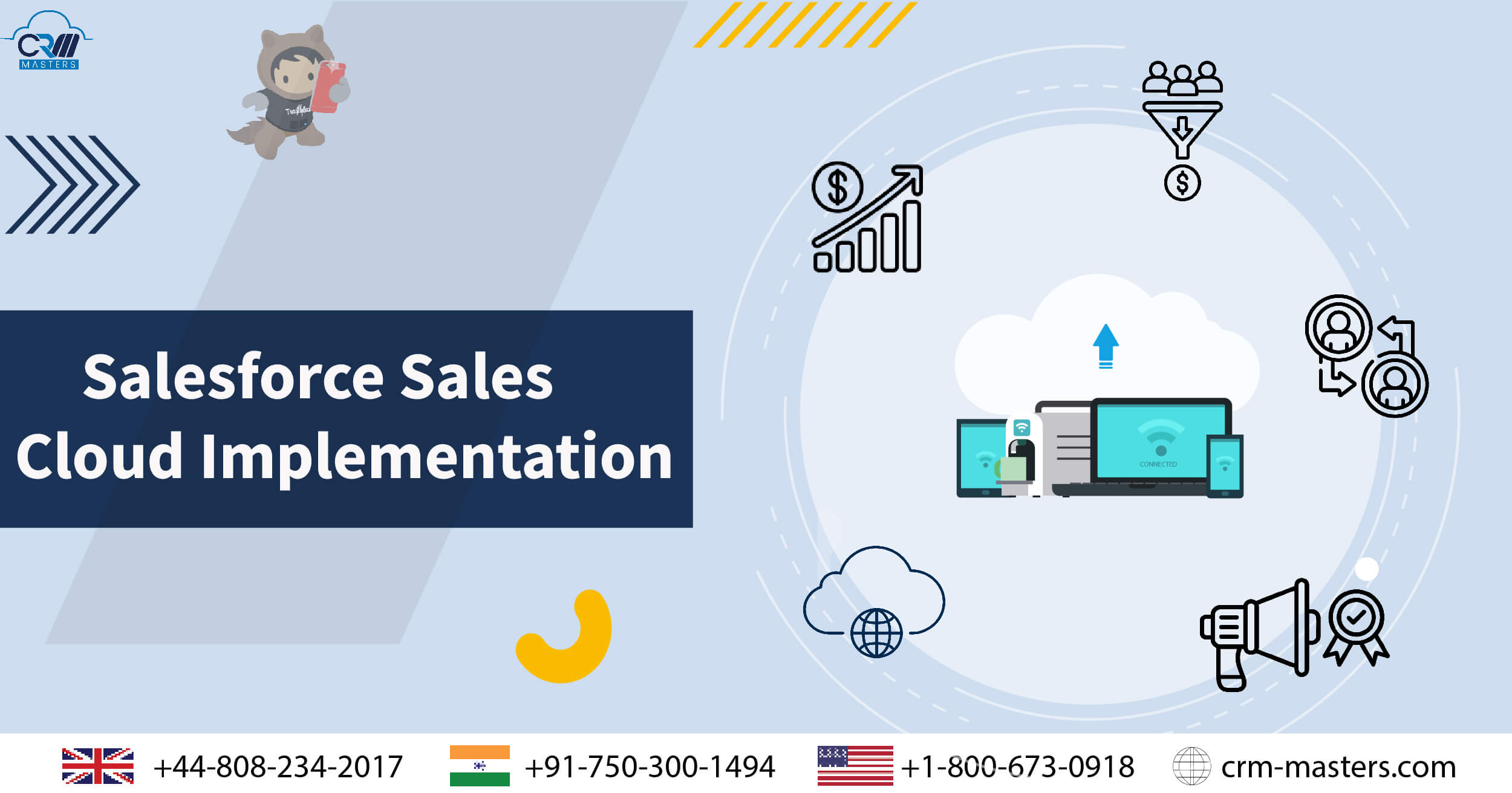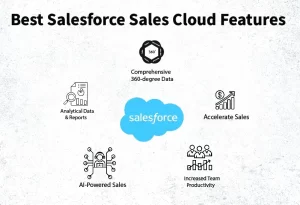
Salesforce Sales Cloud Implementation Guide and Features
In Today’s competitive world customers prefer the top-notch ways to shop and expect every comfortable way possible to purchase. To stay ahead of the competition businesses need to cater to these expectations by using add-ons, customization tools, and other advanced CRM platforms like Salesforce sales cloud.
The Salesforce sales cloud has become quite popular among businesses today because it helps in optimizing sales for the team as well as in providing them with the best user experience in every possible way, which not only boosts sales for the company but also helps them with their business.
In this blog, we will dive into the key steps to how to implement Salesforce and successful Salesforce Sales Cloud Implementation Guide.
What is Salesforce Sales Cloud?
Salesforce Cloud is a cloud-based powerful (CRM) customer relationship management platform that empowers the sales processes and improves customer interaction, and data related to sales in more organizational ways in one centralized platform. Salesforce sales cloud features proven to support the sales team and sales manager throughout the whole sales process from lead generation to closing deals and also managing relationships with current customers.
The following steps will take you through the Salesforce implementation guide.
Define Your Objectives
Before diving into the implementation process, it’s crucial to define your objectives clearly. Determine what you aim to achieve with Salesforce Sales Cloud. Are you looking to streamline lead management, improve sales forecasting, or enhance customer communication? Understanding your goals will guide the rest of the implementation process.
Plan and Strategize
Effective planning is the foundation of a successful Salesforce implementation. Collaborate with your team to create a detailed roadmap. Identify the specific features and functionalities you need, such as lead tracking, opportunity management, reporting, and automation. Create a project timeline and allocate resources accordingly.
Data Migration and Cleansing
Your existing customer data is a valuable asset, make sure to organize your data before migration to ensure accuracy. Salesforce provides data tools and resources to facilitate this process. Remember, clean data is essential for accurate reporting and personalized customer interactions.
Customization and Configuration
Salesforce Sales Cloud offers a high degree of customization. Your business processes and workflows can be tailored, configure fields, layouts, and processes to align with your sales team’s needs.
User Training and Adoption
User adoption is an important aspect of the success of your implementation. Provide comprehensive training to your sales team to ensure they’re comfortable using the platform. Highlight the benefits of Salesforce Sales Cloud, such as time savings, improved collaboration, and enhanced insights.
Integration with Other Systems
Salesforce Sales Cloud can integrate seamlessly with other business systems, such as marketing automation tools. Integration ensures a comprehensive view of customer interactions and streamlines data flow across departments.
Testing and Quality Assurance
Thorough testing is essential before launching Salesforce Sales Cloud to your entire team. Test different scenarios, workflows, and automation to ensure everything functions as expected. Address any bugs or issues promptly to prevent disruptions once the platform is live.
Data Security and Compliance
Protecting customer data should be a business’s topmost priority. Salesforce Sales Cloud offers robust security features to safeguard sensitive information. Implement role-based access controls, data encryption, and authentication protocols. Ensure your implementation complies with relevant data privacy regulations.
Continuous Improvement
Monitor the feedback closely and offer support to users as they start using Salesforce Sales Cloud. Gather feedback and continuously improve the system based on user insights and evolving business needs.
Measure and Optimize
Track key performance indicators (KPIs) to measure the impact of your Salesforce Sales Cloud implementation. Monitor metrics such as sales revenue, conversion rates, and lead-to-close time. Use the insights to identify areas for optimization and improvement.
Best Salesforce Sales Cloud Features

Salesforce Sales Cloud is known as one of the best CRM platforms which helps businesses to manage their end-to-end functioning useful for the sales team. This tool offers everything that is required by the sales team to enhance sales and build better relationships with customers.
Here are some of the top Salesforce sales cloud features to check out:
Comprehensive 360-degree Data
Salesforce Sales Cloud allows businesses with all the customer details that are required by the sales department to get the proper understanding. This helps to stay organized with customer databases as with this feature the sales team can check all the relevant details like payment history, invoices, the status of deals, issues raised, and a lot more.
Accelerate Sales
This tool helps businesses connect with buyers on each and every step of the ongoing deal to make smarter decisions which increases efficiency in the process. Meet buyers wherever they are whether through email, call, or the web, this helps in managing a good customer experience.
Increased Team Productivity
Salesforce integration with Slack helps to manage the deal in real time which speeds the sales process and also strengthens the relationship with clients. Slack app helps sales teams to manage records & stay updated with critical notifications and important updates.
AI-Powered Sales
Pre-built AI for sales into your CRM tool helps businesses to sell smarter with confidence with its explanations and predictions. Utilize Einstein GPT to assist sellers in closing faster by automating and personalizing sales tasks so the sales team can close deals more quickly. AI-driven insights can help to generate insights to focus on the right deal within the right timeframe.
Analytical Data & Reports
This feature helps businesses create proper forecasting reports which lets business managers get clear reports with figures, this allows the sales team to make the right decisions and smarter sales strategies to boost team performance with good numbers.
Conclusion
Salesforce Sales Cloud is a game-changer for businesses seeking to enhance their sales processes and customer relationships. By following this comprehensive guide, you’ll be well-equipped to navigate the implementation journey successfully. Remember, a well-executed implementation can lead to increased sales efficiency, improved customer satisfaction, and sustained business growth.
If you need help Incorporating these best practices into your Salesforce Sales Cloud implementation strategy, CRM Masters Infotech as a Salesforce Sales Cloud Consultant is the answer for you! Contact us today & be to revolutionize your sales operations and achieve remarkable business outcomes.






